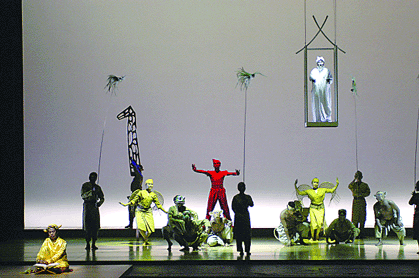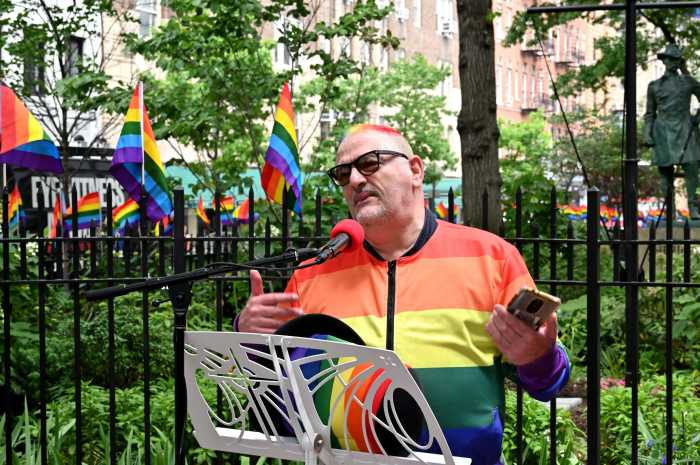Lincoln Center’s summer festival offers “thought opera” without intervals
Two new Lincoln Center musical theater performances this summer shared a certain commonality. Both “I La Galigo” and “Shadowtime” ran for over two hours without an intermission. Sitting in the dark that long, I wondered why producers of modern opera do not include an intermission. A fellow reviewer ventured, “Because they wouldn’t dare,” when I mentioned my concern.
Faced with an unrewarding work of great length, though, even the most tolerant New Yorkers will, and do, walk out. I’d estimate at least one hundred spectators took a hike during the July 13 performance of “I La Galigo.” That’s quite a crowd, given that director Robert Wilson’s known dreamy postmodernist aesthetic is anything but threatening.
Unfortunately, the cast of “I La Galigo” featured a narrator figure whose crouching position downstage afforded him a look at each departure, to which he reacted with barely-concealed eye-rolling scorn. Perhaps, though, after sitting without back support, he was just expressing physical discomfort.
The show features creation myths, shaped by dramaturge Rhoda Grauer into a narrative about a hero who flees an incestuous relationship with his sister to court a glacial Chinese princess. Think “Die Walkuere” meets “Turandot.” However, the mythic elements were sincere to the point of being naive, despite Wilson’s glossy aesthetic being about surface irony. Put the two together, and you get something that looks like a Diana Vreeland’s take on “Beowulf.”
The score by Rahayu Supanggah is new, based on traditional folk and theater music, but the effect on opening night was often oppressive due to the close miking of the orchestra, not to mention the obstructed view of the onstage folk instruments by a tangle of microphone stands and cords. An alto saxophone-like instrument noodled endless melismas at a decibel level more appropriate to heavy metal, and the drumming in the second half of the show got a little too, well, percussive, at least in Row E.
The company included several elderly performers, notably Coppong Daeng Rannu as the Rice Goddess, who made something poetic of a few tiny hand gestures. In the role of the hero’s reluctant bride, the young dancer Sri Qadariatin moved with the confident grace of a fairy tale princess and even found a little sly humor in her character’s over-the-top haughtiness.
Wilson’s shows typically aspire to a timeless, hypnotic quality, one reason, I suppose, for the marathon length of “I La Galigo.”
On July 21, “Shadowtime,” at an unbroken 130 minutes, felt like an even longer haul than “I La Galigo.”
Composer Brian Ferneyhough describes “Shadowtime” as a “metadrama,” a kind of meditation on certain aspects of music and drama, specifically how these arts are communicated and reproduced. Another theme of the work is the failure of the European intelligentsia to effectively resist the rise of Fascism in the early part of the 20th century. The composer’s style is aggressively modern, challenging the audience with multiple layers of sound, angular vocal writing, an obscure text by Charles Bernstein and nothing that remotely resembles a plot.
I guess it is superfluous for me to note that “Shadowtime” has almost nothing to offer in entertainment value, but then, it doesn’t ever pretend to. What puzzles me is not that the piece is dense or hermetic, but why Ferneyhough and Bernstein set the hurdles for their audience so impossibly high. At the performance I attended, the concentration in the audience shut down around the 45-minute mark, after which you might as well have been listening to construction noise.
James Jorden is the editor of parterre box the queer opera zine (parterre.com).
gaycitynews.com



































